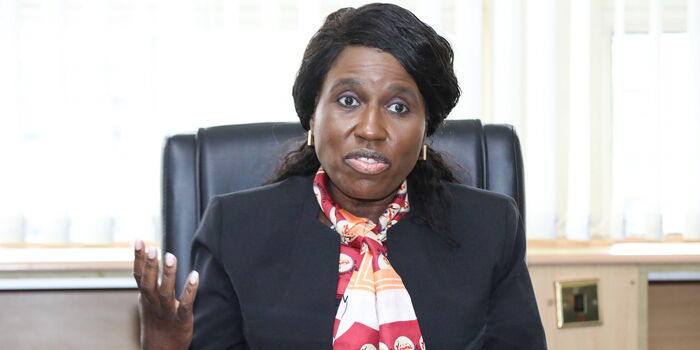- Critics of the new funding model have raised concerns about its potential to disadvantage students from low-income backgrounds.
As discussions intensify around the New Higher Education Funding Model, Prof. Victoria Ngumi, Vice Chancellor of Jomo Kenyatta University of Agriculture and Technology (JKUAT), has expressed optimism about its potential to alleviate the financial crisis plaguing universities.
Speaking on the Explainer Show hosted by Sam Gituku of Citizen TV at JKUAT on September 3, 2024, she highlighted the limitations of the previous model, stating, “With the old model, the Differential Unit Cost (DUC) was decreasing every year, leaving us with no hope of securing additional funds.”
Prof. Ngumi emphasized that the new, student-based model allows universities to accurately cost programs for each student, thereby ensuring that the necessary funds are allocated directly to institutions. “We have simulated this model and anticipate that in about three to four years, we will break even. We could never achieve that with the DUC. This gives us hope as vice chancellors that we can overcome our significant financial challenges,” she said.
However, Dr. Emmanuel Manyasa, the Usawa Agenda Executive Director, contested this view, arguing that the new funding model will not resolve the underlying financial issues facing universities.
“The financial crisis arose partly because universities have not been transparent,” he explained. The government's decision to cut capitation funding was based on estimated earnings, leaving universities in a precarious situation. “Public universities cannot operate solely on fees; they rely on capitation and endowments,” he added.
Read More
Critics of the new funding model have raised concerns about its potential to disadvantage students from low-income backgrounds. Senator Richard Onyoka of Kisii County has emphasized the need for equitable access to education, stating, “A country that cannot care for its most vulnerable is useless. University, primary, and secondary education in Kenya must be free.” His remarks underline the belief that education should be accessible to all, regardless of socioeconomic status.
The issue of allowing students to remain in school without the ability to sit for exams due to fee arrears has also been a point of contention. Dr. Manyasa called this practice unjust, saying, “Let’s not be economical with the truth. A student may spend an entire semester in school, using all their resources, only to be barred from exams due to unpaid fees. Who will support them when they return?”
He further asserted the importance of maintaining an equity perspective in educational discussions. “Intelligence is not confined to wealthy households; it exists in families from all backgrounds. We have brilliant children from poor backgrounds who deserve a fair chance at education.”
Dr. Beatrice Inyangala, the Principal Secretary, State Department for Higher Education and Research, noted that the commission has received numerous appeals from students regarding the new funding model.
“We have about 12,000 students who have lodged appeals. Many are uneasy about their household contributions. Some have indicated they were sponsored in high school, but this information was not previously considered,” she said.
To address these concerns, the commission has enlisted local chiefs to gather further information. “Our goal is to validate and triangulate the information on record, as well as the reasons for the students’ appeals. We have a dedicated team working on this data, and we expect to have results by next week,” Dr. Inyangala said.



-1772102940-md.jpg)


-1772090413-1772095461-md.jpg)
-1772094026-md.jpg)

-1772102940-sm.jpg)


-1772090413-1772095461-sm.jpg)